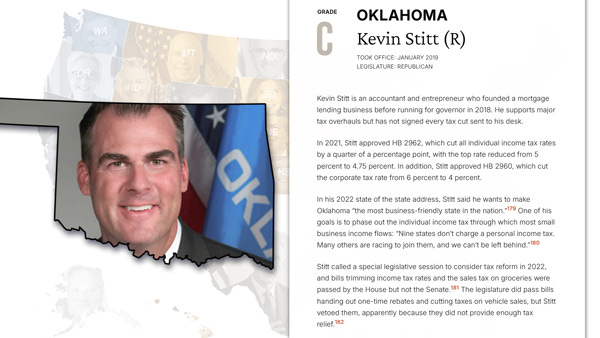In a report released last Friday, The Cato Institute and Truth in Accounting judged the fiscal policy of each of the states. This report grades governors on their fiscal policies from a limited‐government perspective. Governors receiving an “A” are those who have cut taxes and spending the most, whereas governors receiving an “F” have increased taxes and spending the most.
The following is what they found for Oklahoma:
Kevin Stitt is an accountant and entrepreneur who founded a mortgage lending business before running for governor in 2018. He supports major tax overhauls but has not signed every tax cut sent to his desk.
In 2021, Stitt approved HB 2962, which cut all individual income tax rates by a quarter of a percentage point, with the top rate reduced from 5 percent to 4.75 percent. In addition, Stitt approved HB 2960, which cut the corporate tax rate from 6 percent to 4 percent.
In his 2022 state of the state address, Stitt said he wants to make Oklahoma “the most business-friendly state in the nation.”179 One of his goals is to phase out the individual income tax through which most small business income flows: “Nine states don’t charge a personal income tax. Many others are racing to join them, and we can’t be left behind.”180
Stitt called a special legislative session to consider tax reform in 2022, and bills trimming income tax rates and the sales tax on groceries were passed by the House but not the Senate.181 The legislature did pass bills handing out one-time rebates and cutting taxes on vehicle sales, but Stitt vetoed them, apparently because they did not provide enough tax relief.182
However, Stitt and the legislature agreed in 2022 to a bill allowing for full capital expensing, or the immediate write-off of business investments. This reform ensures that Oklahoma businesses will be able to expense investment under the state tax even if federal laws on expensing change.
In 2023, Stitt signed HB 1934, under which all families are eligible for refundable tax credits of up to $7,500 a year to pay for private school tuition. Lower-income families receive larger credits. The bill will reduce taxes by $250 million annually by 2026.183
The same year, the legislature enacted HB 1039, without Stitt’s signature, to eliminate the state’s franchise tax, which was a tax on a company’s net worth.184 Franchise taxes are unnecessary nuisance taxes on businesses that numerous states have eliminated in recent years, including Kansas, Rhode Island, Pennsylvania, and West Virginia.185
In 2024, Stitt signed HB 1955, which ends the state-level 4.5 percent sales tax on groceries, to save Oklahomans about $400 million a year. Only about a dozen states continue to tax groceries after a wave of repeals in recent years under both Republican and Democratic governors.
Stitt also pushed to cut the top individual income tax rate from 4.75 percent to 4.5 percent. The Oklahoma House passed HB 2950, which would have adopted a 4.75 percent flat tax and scaled it down in the future, but the Senate did not go along with the plan.186
Stitt called once again to repeal the income tax: “With record savings and surpluses, I’m asking, ‘If not now, when? . . . In the 1990s, we were at 7% income tax. So I’m renewing my call. Let’s get Oklahoma back on the path to zero.”187
Some legislators worry that the state budget cannot afford another tax rate cut, but the state spends millions of dollars on corporate subsidies that should be repealed. The budget that was passed in 2023, for example, spent $698 million on the Large-Scale Economic Activity and Development Fund.188 Reducing overall business tax rates is a better way to grow the economy than subsidizing specific projects.
The budget has increased substantially under Stitt, although he has pushed back on the legislature’s overspending. He refused to sign the 2024 budget, which reduced reserves and increased general fund spending by 9.5 percent.189 His budget for fiscal 2025 called for “mostly flat spending” compared to fiscal year 2024.190





Wow! This is eye-opening. I thought that Governor Stitt was doing far better than this. Thank-you for the research and reporting of the facts, David.